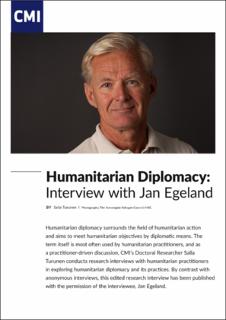Humanitarian Diplomacy: Interview with Jan Egeland
Others
Permanent lenke
https://hdl.handle.net/11250/2831745Utgivelsesdato
2020-11-01Metadata
Vis full innførselSamlinger
- Publications [1488]
Sammendrag
Humanitarian diplomacy surrounds the field of humanitarian action and aims to meet humanitarian objectives by diplomatic means. The term itself is most often used by humanitarian practitioners, and as a practitioner-driven discussion, CMI’s Doctoral Researcher Salla Turunen conducts research interviews with humanitarian practitioners in exploring humanitarian diplomacy and its practices. By contrast with anonymous interviews, this edited research interview has been published with the permission of the interviewee, Jan Egeland.
Jan Egeland served as the United Nation’s Under-Secretary-General for Humanitarian Affairs and Emergency Relief Coordinator from 2003 to 2006 during Kofi Annan’s time as UN Secretary-General. In that role he contributed to reforming the global humanitarian response system and organized the international response to, among others, the Indian Ocean Tsunami of 2004. Currently, Egeland is Secretary-General of the Norwegian Refugee Council (NRC), serving in this role since August 2013. As the head of this large INGO, he oversees the work of the humanitarian organization in 30 countries affected by conflict and disaster. In addition to these roles, he has served as Special Adviser to the UN Special Envoy for Syria appointed by former UN Secretary-General Ban Ki-moon; the European Director at Human Rights Watch; Special Adviser to the UN Secretary-General for Conflict Prevention and Resolution; the Director of the Norwegian Institute of International Affairs; the UN Secretary General’s Special Adviser on Colombia; State Secretary of the Norwegian Ministry of Foreign Affairs; Secretary-General of the Norwegian Red Cross; and he has held leading positions at Amnesty International. In 2006, Time magazine named Egeland one of the “100 people who shape our world.”
Salla Turunen: What does humanitarian diplomacy mean to you? Jan Egeland: Humanitarian diplomacy to me means decision
